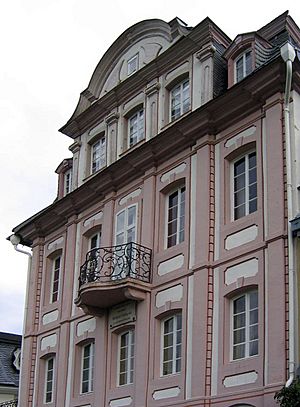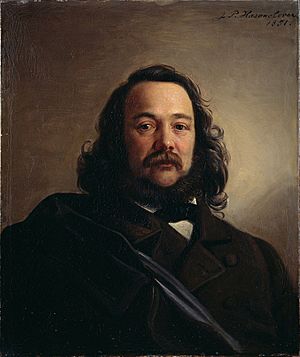Ferdinand Freiligrath facts for kids

Ferdinand Freiligrath (born June 17, 1810 – died March 18, 1876) was a German poet and translator. He was also a strong supporter of freedom and change. He is known as part of the Young Germany movement, a group of writers who wanted to make Germany more modern and democratic.
Life of Ferdinand Freiligrath
Ferdinand Freiligrath was born in Detmold, Germany. His father was a teacher. When he was 16, Ferdinand left school to learn about business in Soest. There, he also started reading French and English books. Before he turned 20, he had already published some of his poems in local newspapers.
From 1831 to 1836, he worked as a bank clerk in Amsterdam. He translated poems by the famous French writer Victor Hugo. He also helped start a literary magazine called Rheinisches Odeon. In 1837, he moved to Barmen and worked as a bookkeeper until 1839. During this time, he wrote poems for popular literary journals.
His first book of poems, Gedichte, came out in 1838. It became very popular right away. This book included poems like "Löwenritt" (Lion Ride) and "Der Mohrenfürst" (The Moorish Prince). His early poems often talked about faraway places and exciting subjects. For example, "Der Mohrenfürst" tells the story of a brave black prince who becomes a slave and then a circus drummer. This poem was even turned into a song by Carl Loewe.
Because his poems were so successful, Freiligrath decided to become a full-time writer in 1839. In 1842, the king of Prussia, Frederick William IV, gave him a special payment of 300 thalers each year. Freiligrath got married and moved to St. Goar to be close to his friend, the poet Emanuel Geibel.
Freiligrath also became friends with the American poet Henry Wadsworth Longfellow. They met in 1842 while Longfellow was visiting Germany. Freiligrath was very interested in English and American poetry. They often met to talk about books. Longfellow even gave Freiligrath copies of his own books. They continued their friendship by writing letters to each other.
Over time, Freiligrath became more interested in politics. This was partly because of government control over what people could write (called censorship). Another poet, August Heinrich Hoffmann von Fallersleben, encouraged him. In 1844, Freiligrath gave up his payment from the king. He wrote a poem called Glaubensbekenntnis (Confession of Faith). In this poem, he used his writing skills to support democratic ideas. These ideas later led to the Revolution of 1848.
Poems like "Trotz alledem" (Despite All That) and "Die Freiheit" (Freedom) made it safer for him to leave Germany. He went to Belgium, where he met Karl Marx. Then he moved to Switzerland and later to London, England. In London, he published a book of translated English poems and a collection of political songs. He lived in England until 1848, working in business again. He even thought about moving to America after Longfellow invited him.
However, when democratic ideas briefly won in Germany, he returned home. In 1843, the famous composer Franz Liszt set Freiligrath's poem "O lieb, so lang du lieben kannst" (Oh, Love as Long as You Can Love) to music. This song later became one of Liszt's most famous piano pieces, "Liebesträume" No. 3.
When Freiligrath came back to Germany, he settled in Düsseldorf. He helped start a newspaper called Neue Rheinische Zeitung with Karl Marx and Friedrich Engels. Soon, he got into trouble with the government again because of a poem called Die Toten an die Lebenden (The Dead to the Living, 1848). He was arrested for "insulting the king." But he was found not guilty in court. This trial was important because it was the first time a jury trial was held in Prussia.
He published more political poems in 1849 and 1850. But because he was involved in the democratic movement, he was always watched closely. In 1851, he decided it was safer to go back to London. There, he became the director of a bank branch and lived in Hackney. He stayed in London until 1868. He earned money by working in an office and translating poems. He translated Longfellow's Hiawatha and plays by William Shakespeare, like Cymbeline. These translations kept him popular in Germany. In 1866, people collected a lot of money (60,000 thalers) to help him. This was also a way to show support for his political ideas.
After a government pardon in 1868, Freiligrath returned to Germany. He lived first in Stuttgart and then in Cannstatt in 1875. He became a strong supporter of his country. He wrote patriotic poems like "Hurrah, Germania!" after Germany won the Franco-Prussian War. His 1848 poem In Kümmernis und Dunkelheit gave military meaning to the colors of the German flag. He said black was for gunpowder, red for blood, and yellow for the glow of fire. Ferdinand Freiligrath died in Cannstatt in 1876.
Works
See also
 In Spanish: Ferdinand Freiligrath para niños
In Spanish: Ferdinand Freiligrath para niños
 | Percy Lavon Julian |
 | Katherine Johnson |
 | George Washington Carver |
 | Annie Easley |


